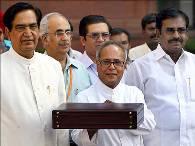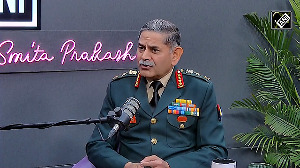 From withdrawing the stimulus to implementing the Finance Commission proposals, the FM has his task cut out, says A K Bhattacharya.
From withdrawing the stimulus to implementing the Finance Commission proposals, the FM has his task cut out, says A K Bhattacharya.
His first Budget was presented in July 2009 under trying circumstances, with the Indian economy struggling hard to tide over the impact of a global economic downturn.
His second Budget, to be presented in less than eight weeks from now, will have a different set of challenges.
The Indian economy is doing much better now, with growth expected to be close to around 8 per cent in the current financial year. Since growth prospects for the next financial year have considerably improved and inflation worries are set to return, Mukherjee's big dilemma will be whether his second Budget should tighten the fiscal rein a bit.
Most central ministries have already begun pressuring him to release more funds to them by way of budgetary support. Should he agree to spend more money next year also, ignoring the need to reduce fiscal deficit, or decide to control government expenditure, which has seen runaway growth in the last one year? Mukherjee's final response to this key question will make the big difference to the 2010-11 Budget.
Mukherjee's team for the second Budget will largely remain unchanged. Finance Secretary Ashok Chawla, Revenue Secretary PV Bhide and Expenditure Secretary Sushma Nath worked as a team even for his first Budget. The only new entrant at the top level is Kaushik Basu, who recently joined the finance ministry as chief economic advisor.
Basu, an accomplished economist, has had no experience of working in the government. His appointment is believed to have taken place because Prime Minister Manmohan Singh was keen on his joining the government. Basu is also close to Planning Commission Deputy Chairman Montek Singh Ahluwalia and, at the same time, he is reported to have struck a good working equation with Mukherjee.
Ironically, however, his close association with the prime minister and the Planning Commission deputy chairman may not be of much help. Before presenting his first Budget in 2009, Mukherjee had approached Congress chief Sonia Gandhi, and asked her for broad directions to be incorporated in his fiscal policies and expenditure allocation plan.
Yes, he did consult the prime minister and he also received suggestions from the Planning Commission. But it was clear to all in the finance ministry that Mukherjee preferred his Budget to be seen as his initiative without any influence of either the Prime Minister's Office or the Planning Commission. If anyone mattered on Budget issues outside the finance ministry, it was only Sonia Gandhi.
At another level, the strong network of officials of the Indian Administrative Services (IAS) cadre may also come in the way of Basu's effective functioning, unless he is sufficiently empowered from within the finance ministry and by none else than the finance minister.
Information available in the finance ministry suggests that Basu has not yet been adequately empowered to make the kind of interventions that he needs to make to become relevant for government policymaking. Things may change as these are early days.
However, the preparations for Mukherjee's second Budget so far remain largely under the grip of the IAS secretaries in the finance ministry. Basu, still considered an outsider by many of these IAS officials, is yet to make the required inroads.
The third element that has made Mukherjee's Budget for 2010-11 an interesting exercise is the Direct Taxes Code that is now under examination by the finance ministry. The bulk of the Direct Taxes Code was prepared by a team of officials, when Palaniappan Chidambaram was at the helm of the finance ministry.
Mukherjee has not hesitated to abolish any taxes or initiatives with which he is not comfortable even though they might have been introduced by his predecessor. The scrapping of the fringe benefit tax in the last Budget was one such example.
Several experts and industry representatives have raised serious objections to many provisions in the Direct Taxes Code. Even officials within the Central Board of Direct Taxes have raised issues over the implementation of a few of the provisions in the Direct Taxes Code.
For Mukherjee, the second Budget will be an opportunity to assert his viewpoint on what all provisions in the Direct Taxes Code should be retained. If the fate of the fringe benefit tax is any indication, the final shape of the Direct Taxes Code may spring many surprises.
There is also the proposal on the introduction of the Goods and Services Tax from April 2010. The final shape of the GST is not yet ready and its implementation may be delayed beyond the target date.
The Budget for 2010-11, however, will have to necessarily make provisions for the new tax structure, in the same way as it would have to reflect the tax-related recommendations of the Thirteenth Finance Commission, whose report is now with the finance ministry.
How well these recommendations are reflected in the Budget will be clear only on February 27, 2010!








 © 2025
© 2025